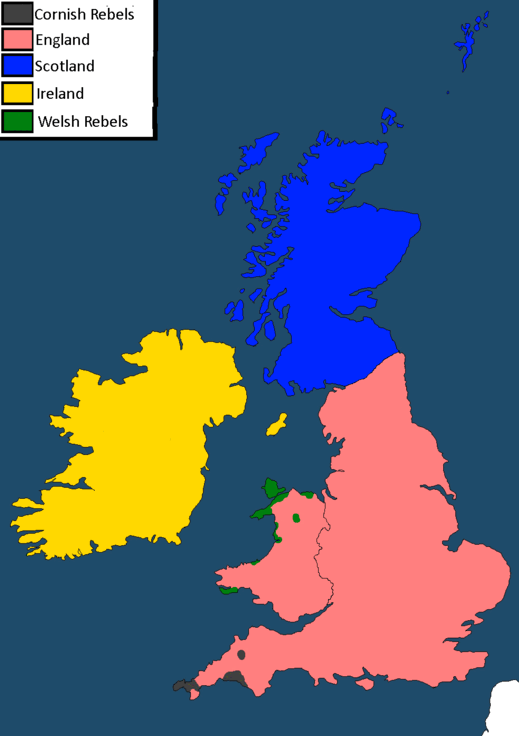Fifth England War
| Fifth England War | |||
|---|---|---|---|
 | |||
| Video | https://www.youtube.com/watch?v=uGotQZbbm4w | ||
| Date | 73 CE | ||
| Location | British Isles | ||
| Outcome | England was partitioned between Cornwall and Yetia. | ||
| Combatants | |||
| |||
| Commanders | |||
The recently established Third Kingdom of England that emerged following the 13th Yetian Civil War was quick to fall to internal troubles as its non-english minorities began to be quite actively mistreated by the government, inspiring the nation's Cornish and Welsh minorities to launch a series of largescale revolts against the government, with the Cornish Free Army and Welsh Free Army rising up against the government, soon unifying with one another into the Brythonic Kingdom once both had properly established themselves, breaking through the enemy lines and advancing deep into England. This offensive would not last though as the English launched a successful counteroffensive, pushing Brythonia back to their final fortifications on the South West Peninsula, successfully stopping England from advancing further.
Due to sympathies to Brythonia's ideological cause, Scotland provided volunteer soldiers to Brythonia in their defensive efforts, leading to England sending a ultimatum demanding that they stop or else they would attack. Scotland and Ireland together discussed the situation, and agreed to launch a surprise attack on England to support Brythonia, though despite this not happening yet numerous English headed out into the Sea of the Hebrides and the Scottish border, soon revealing that their spies had picked up on the invasion plans, promptly launching an invasion into Scotland. England soon allied itself with local Scottish nobles, whom convinced Sizzle to send several armies to support England in its war effort due to their supposed mistreatment by Scotland. The Sizzlean intervention was soon noticed by the Celtic forces during a major offensive into Brythonia and Loch Lomond by England, prompting them to request support from Yetia, whom accepted in return for territorial concessions. Sizzle was confused by these actions, stating that they had been told England was the defender not the aggressor unlike what Yetia had been told, leading to Sizzle switching sides to oppose England due to these lies.
King Alexander I of Scotland began becoming increasingly anxious of defeat as England successfully cut Scotland in two and launched an invasion of Ireland thru Cork, prompting Sizzle to begin additional support to the Celtic forces. King Alexander I surrendered to the English forces once they advanced towards Aberdeen, though the Scottish military continued to resist enemy actions against them. Once a Scottish advance into England thru Cumbria was cut off Yetia finally decided to act, launching an invasion of Southampton, coinciding with a major battle between the English and Scots in South Western Scotland which led to a catastrophic English defeat due to being ambushed. Ireland's situation began to become equally dire as Dublin fell to English forces, forcing them to relocate their government to Galway. Sizzle began sending considerable support to the defending nations as Yetia came from the south, leading to a massive Scottish incursion into England itself, allowing Yetia to capture London leading to England beginning to fall into disarray. England began losing on all fronts as all of their territories began falling to enemy forces, largely attempting to hold out in the Scottish Highlands due to its difficult terrain, soon also occupying the Shetland islands. The Shetlands would soon become the final English fortress as enemy forces closed in to stop their napalm-usage, seeing them as an existential threat which must be dealt with, soon falling against the overwhelming forces after leaving much of the British Isles in smouldering ruins.
At the conclusion of the war the Brythonic Kingdom was disbanded, allowing Cornwall to gain its independence as a republic with the rest of England being reintegrated by Yetia. Hoping to establish a front to prevent such conflicts in the future the victors of the war founded the Eurasian Union as a joint economic pact, greatly boosting each nation's economy.